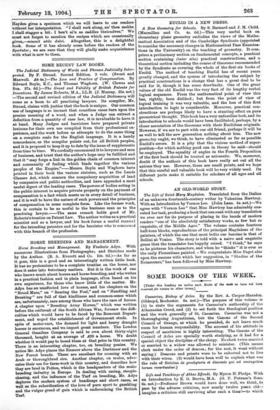The Judicial Dictionary of Words and Phrases Judicially Inter- preted.
By F. Stroud. Second Edition. 3 vols. (Sweet and Maxwell. 24 4s.)—The Law and Practice of Compensation. By Edward Boyle, K.C., and Thomas Waghorn. (W. Clowes and Sou. 37s. 6d.)—The Grant and Validity of British Patents for Inventions. By Tames Roberts, M.A., LL.B. (J. Murray. 25s. net.) —The second and revised edition of the Judicial Dictionary will come as a boon to all practising lawyers. Its compiler, Mr. Stroud, claims with justice that the book is unique. Our common use of language is BO inexact that countless cases turn upon the precise meaning of a word, and when a Judge can extract a definition from a quantity of case law, it is invaluable to have it at hand. Many Judges and barristers have prepared private lexicons for their own use compiled from their professional ex- perience, and the work before us attempts to do the same thing on a complete scale for the English language. It is a handy concordance, as the compiler points out, for all British peoples, and it is proposed to keep it up to date by the issue of supplements from time to time. We cordially recommend it to lawyers and men of business, and trust that the author's hope may be fulfilled and that it "may forge a link in the golden chain of common interest and community of feeling which binds together the various peoples of the Empire."—Messrs. Boyle and Waghorn have printed in their book the various statutes, such as the Lands Clauses Act, which concern the compulsory acquisition of land by companies and public authorities, and have appended a most useful digest of the leading cases. The powers of bodies acting in the public interest to acquire private property on the payment of compensation is a fact which meets us in every detail of business, and it is well to have the nature of such powers and the principles of compensation in some complete form. Like the former work, this is certain to be as useful to the business man as to the practising lawyer.—The same remark holds good of Mr. Roberts's treatise on Patent Law. The author writes as a practical scientist and as a lawyer, and his book forms a useful manual for the intending patentee and for the barrister who is concerned with this branch of the profession.






































 Previous page
Previous page